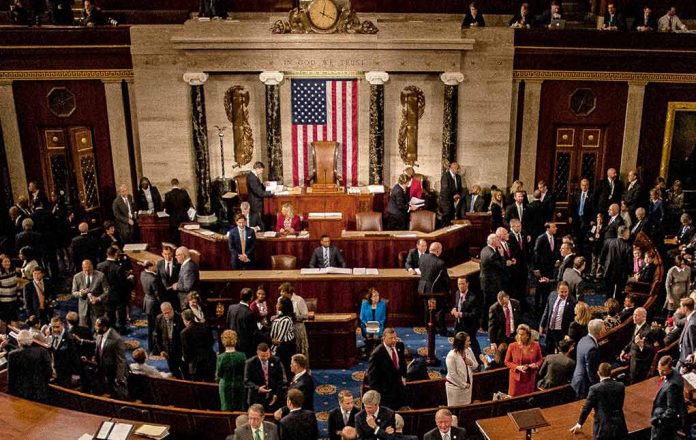
Congress moves to scrap Biden’s bank overdraft fee cap as Republicans argue it would reduce banking options for millions of Americans.
Key Takeaways
- The House voted 217-211 to overturn a Biden administration rule that would have limited bank overdraft fees to $5, following similar Senate action.
- Banks currently earn approximately $8 billion annually from overdraft fees, which can be as high as $35 per transaction.
- Republicans argue the regulation would force banks to stop offering overdraft protection and limit credit access for many consumers.
- Democrats oppose the repeal, claiming it primarily benefits large banks at the expense of vulnerable consumers.
- The resolution now heads to President Trump’s desk for his signature, which would officially nullify the regulation.
House Votes to Eliminate Biden’s Overdraft Fee Regulation
The House of Representatives has voted to overturn a Biden administration rule that sought to cap bank overdraft fees at $5, following the Senate’s earlier approval of the same measure. With a narrow vote of 217-211, largely along party lines, the resolution will now proceed to the White House where President Trump is expected to sign it. This action effectively nullifies a regulation that would have applied to banks and credit unions with over $10 billion in assets, affecting how financial institutions can charge customers when they spend beyond their available balance.
House votes to overturn Biden-era rule limiting bank overdraft fees to $5, sends to Trump to sign https://t.co/BevPEfyWRH pic.twitter.com/WX4RIEUhvk
— darlene superville (@dsupervilleap) April 10, 2025
The Republican-led effort utilized the Congressional Review Act, which allows Congress to reverse federal regulations with a simple majority vote. Currently, there is no legal cap on overdraft fees, which can reach as high as $35 per transaction. The nation’s largest banks collect approximately $8 billion annually from these charges, which critics argue disproportionately impact financially vulnerable Americans who may have limited cash reserves.
Banking Industry Concerns and Republican Arguments
Republicans and banking industry representatives have strongly opposed the regulation, claiming it would have unintended negative consequences for consumers. They argue that without the ability to charge meaningful overdraft fees, many financial institutions would simply stop offering overdraft protection services altogether, limiting options for customers who occasionally need to cover emergency expenses. This could potentially push consumers toward less regulated alternative financial services with higher costs.
Arkansas Representative French Hill, who led the repeal effort, emphasized this market-based approach. Banking industry representatives, including American Bankers Association president Rob Nichols, reinforced this position, noting that “Without access to overdraft protection, many Americans would be driven to less regulated and higher risk non-bank lenders to cover unexpected or emergency expenses.” The regulation would have required banks to choose between three options for assessing fees, including the flat $5 fee.
Democratic Opposition and Consumer Protection Concerns
Democrats have vigorously defended the original regulation, portraying it as a necessary consumer protection measure. They argue the rule would have saved American consumers an estimated $5 billion annually by preventing what they characterize as exploitative overdraft practices. California Representative Maxine Waters expressed that Americans are “fed up with these junk fees” that can cascade into multiple charges from a single overdraft event, placing significant financial strain on those already struggling financially.
Consumer advocates like Chuck Bell have highlighted that overdraft fees originated in the paper-check era to prevent checks from bouncing but have evolved into a significant profit source for financial institutions. Michigan Representative Rashida Tlaib criticized Republicans for “shamefully targeting the American people” with the repeal effort. The regulation was part of President Biden’s broader initiative to reduce various consumer “junk fees” across industries, which his administration claimed were unnecessarily burdening American households.
Historical Context and Broader Implications
Overdraft fees have been a contentious issue for decades. Originally designed as a courtesy service to prevent bounced checks, they have evolved into a reliable revenue stream for banks. The Biden rule aimed to close what critics describe as a loophole from the paper-check era that has allowed banks to profit when customers spend more than their available balance. With the Congressional overturn of this regulation, banks will maintain their current flexibility in setting overdraft fee amounts and policies.
The debate reflects broader philosophical differences about the appropriate role of government in regulating financial markets. Republicans generally favor less regulation and market-based solutions, while Democrats typically support stronger consumer protections and limits on certain banking practices. For average Americans, particularly those living paycheck to paycheck, the outcome means that higher overdraft fees will remain a potential financial concern, requiring continued vigilance in monitoring account balances to avoid unexpected charges.
Sources:
House votes to overturn Biden-era rule limiting bank overdraft fees to $5, sends to Trump to sign
House votes to overturn Biden-era rule limiting bank overdraft fees to $5, sends to Trump to sign
House Votes to Overturn Biden-era Rule Limiting Bank Overdraft Fees



